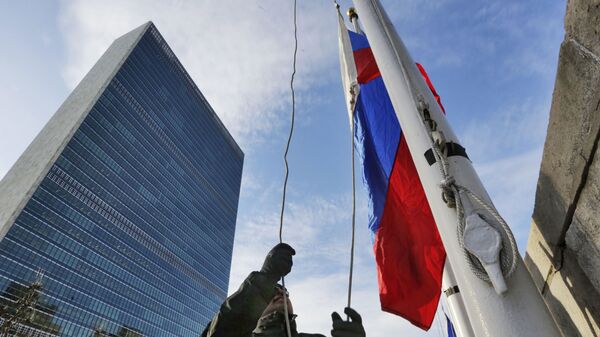The OPCW on Tuesday asserted that a substance similar to nerve agent Novichok, but not included in the list of banned chemicals, had been found in Navalny's body. The German government said the OPCW statement in the Navalny case confirmed that the Russian political opposition figure's poisoning with a Novichok group substance.
“Until we are given documents, materials, samples, material evidence, which - as those who bring charges against us say - prove the presence in Navalny's tests of an alleged chemical warfare agent, until they sit down with us at the negotiating table for interested dialogue at the level of experts, we will consider all that happens around this incident an unbridled propaganda campaign of lies, or, more simply, a low-grade provocation,” Shulgin said.
“Its purpose is obvious - to try, in the interests of geopolitics, to denigrate Russia with a series of unsubstantiated accusations and thereby create a far-fetched reason for introducing another 'tranche' of sanctions against our country,” he added.
Shulgin pointed out that Moscow regrets that Berlin launched an accusatory campaign against Russia “without presenting any facts” and brought it to the OPCW.
“In this case, the Russian Federation initially took the most transparent and constructive position. The German government, in turn, instead of establishing normal channels of bilateral interaction to clarify the reasons for what happened, speak to our Prosecutor General's Office, preferred to launch some kind of accusatory campaign against Russia without presenting any facts and without presenting any materials brought it to the OPCW. This is regrettable,” the envoy said.
He added that Moscow, in the situation with Navalny, does not accept a conversation based on ultimatums and threats.
“Russia does not accept a conversation based on ultimatums and threats. We are ready to cooperate, but solely on an equal, mutually respecting basis,” Shulgin said.
Navalny was hospitalized in the city of Omsk on 20 August after he fell ill on board a plane. Based on the test results, local doctors described the diagnosis as a metabolic disorder causing a sharp change in the politician's blood sugar level. It is not stated what caused the glucose drop, but, according to Omsk doctors, no poisons were found in Navalny's blood and urine.
The opposition figure was subsequently transported by plane to Germany. The German government alleged, citing military medics, that Navalny had been poisoned with a substance from the Novichok group of toxic warfare agents produced in the former Soviet Union. Later, the German cabinet said the conclusions of national experts had been confirmed by laboratories in Sweden and France, in parallel, at Berlin's request, with the OPCW conducting its own research.
The Kremlin noted that Berlin did not inform Moscow of its findings and the Russian Foreign Ministry stressed that Russia was waiting for a response from Germany to an official request regarding the situation. A Russian Foreign Ministry spokeswoman, Maria Zakharova, said that during a one-month period, Russia had sent Germany no less than three requests for legal assistance regarding the situation with Navalny, and no answers had been received.
The Berlin-based Charite hospital on 23 September reported that Navalny had been discharged from the hospital, his condition was satisfactory, and doctors did not rule out a complete recovery.




